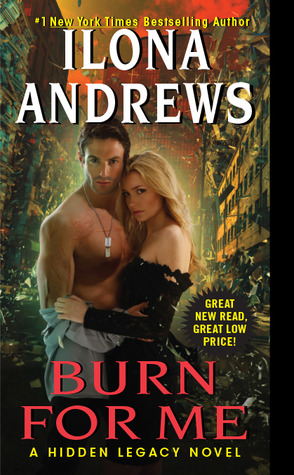 It is very rare for me to read an insider’s guide to a series. If I’ve taken the time to invest in a particular set of books, I usually will have reread them enough to not have many questions. I don’t know what that says about me as a reader, that I don’t really care about the minutiae of an author’s world or his/her characters, but there it is. Yet in the course of reading J.R. Ward’s The Black Dagger Brotherhood: An Insider’s Guide I have been surprised by what I’ve learned or been inspired to think about: 1) J.R. Ward is probably a little crazy, because she has whole interviews and conversations with her characters in her head, and 2) the question of erotica vs. romance is still very much up for debate.
It is very rare for me to read an insider’s guide to a series. If I’ve taken the time to invest in a particular set of books, I usually will have reread them enough to not have many questions. I don’t know what that says about me as a reader, that I don’t really care about the minutiae of an author’s world or his/her characters, but there it is. Yet in the course of reading J.R. Ward’s The Black Dagger Brotherhood: An Insider’s Guide I have been surprised by what I’ve learned or been inspired to think about: 1) J.R. Ward is probably a little crazy, because she has whole interviews and conversations with her characters in her head, and 2) the question of erotica vs. romance is still very much up for debate.In the course of discussing her books’ place in the spectrum, Ward writes that “with romance, sex affects the emotional bonds of the characters and propels those connections forward. With strict erotica, the sexual act or sexual exploration itself is the focus” (158, Ward). This was an intriguing definition for me. Rarely do people so succinctly lay out the boundaries of what is romance and what is erotica- and yet where a novel lays between these two extremes might not be as easily determined. Books that are typically defined by publishers and book stores as romance often combine different elements from a number of genres to create their storylines (I’m not going into what is a genre and what’s not here – I’ll leave that for another discussion). Erotica, as just another genre in and of itself, is starting to be used the same way.
Even in the most ‘romantic’ of romances, at least today, I would say there exists the presence of sex just for the sake of sex. Maybe it’s indicative of the changing place of women’s empowerment in society, or an example of how generational shifts in readers can create a corresponding shift in how authors use their words to reach their readers, there’s no real way to know. What is important is that the changing paradigm of romance is starting to include more sexually explicit material. For the better I would say, because it tends to lend a type of real-ness or depth to the characters’ interactions that was not there before. Books by JR Ward or her contemporaries (Laurell K Hamilton, Sherilyn Kenyon, Emma Holly, and some non-paranormal ones: Lora Leigh, Lori Foster, Nora Roberts) are moving beyond just the purely emotional attachment – the physical is becoming just as important.
The point, if I have one, is that as much as Ward can define the individual elements of romance and erotica I don’t think it’s as easy to extrapolate those labels to entire novels. There is a marked increase of authors who are jumping from ‘erotica’ e-books to physical novels that are on every bookshelf in every bookstore across the world, right in the romance section, with new books that are barely (if at all) different from what they used to only be able to publish online. The applicability of these labels is becoming extinct. When I do a review now I use on average 5-6 terms to try and describe the elements of a book, INCLUDING romance and erotica (together or separately- one doesn’t exclude the other). There seems to exist in my head a little box that gets checked for erotica depending on the frequency of sexual encounters in a book and how explicit the description of those encounters are. It’s more the happy ending, the happily ever after, that makes me call something romance or not. Yet even books that don’t have a happy ending, but instead maybe allude to one in a future novel, or even just include a more one-on-one personal emotional attachment, will get called a romance by me.
It’s a whole new ball game out there for fiction readers, and the playground, along with the rules, are changing every day.











